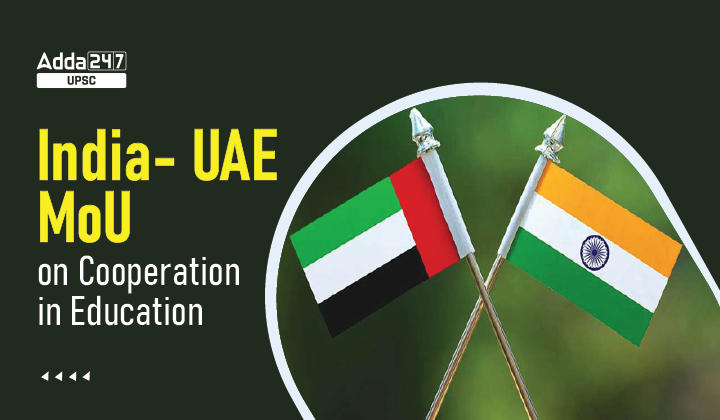Table of Contents
India-UAE MoU on Education- Relevance for UPSC Exam
- GS Paper 2: International Relations- Bilateral, regional and global groupings and agreements involving India and/or affecting India’s interests.
India-UAE MoU on Education in News
- Recently, Union Cabinet has approved to sign a MoU between the Ministry of Education, Government of India and the Ministry of Education of the Government of United Arab Emirates on cooperation in the field of Education.
India-UAE MoU on Education
- Background of India-UAE MoU on Education
- An MoU was signed in 2015 with UAE in the field of Education which expired in 2018.
- In 2019, at a meeting between Education Ministers of the two countries, UAE side proposed to sign a new MoU.
- About: The new India-UAE MoU incorporates changes brought in by the National Education Policy (NEP) 2020 in India’s education ecosystem.
- Key Objective: Objective of the India-UAE MoU on Education is to further strengthen our ongoing educational collaboration between India and UAE and widen the scope of our engagements.
- Mandate: India-UAE MoU on Education aims to-
- Promote Exchange of Information Education, Capacity Development of Technical and vocational Education and Training (TVET) teaching staff,
- Facilitation of academic collaboration between Higher Education Institutions in both the countries for offering Twinning,
- Joint Degree and Dual Degree Programmes and any such other areas agreed upon.
India-UAE MoU on Education
- The new MoU incorporates changes brought in by the National Education Policy 2020 in India’s education ecosystem.
- India-UAE MoU on Education will rejuvenate educational cooperation and increase academic mobility between India and UAE besides facilitating exchange information in order to promote mutual recognition of these qualifications.
- It also covers cooperation in TVET as UAE is a major work destination for Indians.
- India-UAE MoU on Education will be valid for a period of five years from the date of signing and will be automatically renewable with the consent of both parties.
- Once signed, this MoU shall supersede the earlier MoU signed with UAE in 2015, which will then cease to have effect.
Key points About NEP-2020
- It is the third education policy of our country. The earlier two was launched in 1968 and 1986.
- This national policy came after a gap of 34 years.
- It is based on the recommendations of Kasturirangan committee.
- It renames the Ministry of Human Resource Development to Ministry of Education.
- It proposes a 5+3+3+4 curricular and pedagogical structure.
| Stages | Years | Class | Features |
| Foundational | 3-8 | 3 years of pre-primary and 1-2 | Flexible, multi-level, activity-based learning |
| Preparatory | 9-11 | 3-5 | Light textbooks, more formal but interactive classroom learning |
| Middle | 12-14 | 6-8 | Introduction of subject teachers for learning of more abstract concepts, experimental learning |
| Secondary | 15-18 | 9-12 | Reading in-depth, critical thinking, greater attention to life aspirations |
Implementation of NEP-2020
- There will be an apex body called Higher Education Commission of India (HECI), which will resolve disputes among the following bodies.
| Bodies | Features |
| NHERA (National Higher Education Regulatory Authority) | Light but tight regulation |
| NAC (National Accreditation Commission) | Meta-accrediting agency |
| HEGC (Higher Education Grants Council) | Responsible for funding |
| GEC (General Education Council) | frame expected learning outcomes for higher education programmes. |



 TSPSC Group 1 Question Paper 2024, Downl...
TSPSC Group 1 Question Paper 2024, Downl...
 TSPSC Group 1 Answer key 2024 Out, Downl...
TSPSC Group 1 Answer key 2024 Out, Downl...
 UPSC Prelims 2024 Question Paper, Downlo...
UPSC Prelims 2024 Question Paper, Downlo...
